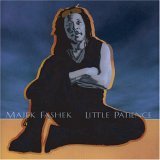 Majek Fashek: Little Patience, Coral Music, 2004 Majek Fashek: Little Patience, Coral Music, 2004
www.coralmusicgroup.com
Rating: A
Wow. Here’s a man with a mission. On his latest album Majek Fashek sounds positively frantic to get his music out. Maybe he didn’t read the title, Little Patience.
Here’s just a taste of what Fashek has jammed onto this CD. He incorporates rock dynamics (and rock guitar) more strongly than ever, with sax and brass all over the place and keyboards here and there; he invokes a virtual pantheon of religious figures; he impressively pays his respects to his mentor and fellow Nigerian, the late Fela Anikupalo Kuti, with a cover of “Water No Get Enemy.” His lyrics range from childlike simplicity (“This little light in my soul, I’m going to let it shine”) to either baffling enigma or just plain dumb question (“What does it take to be a virgin?”) to mature contemplation (“Down by the seaside where love and misfortune flow/That where I sat to play some music”). In short, Fashek has delivered a full measure of proficient, emphatic, jazzy, confident reggae. In short, he covers the waterfront. This is a busy album.
The whole disk is enjoyable, but I have some favorite tracks. “Man of Sorrow” has a moody Hammond organ, while horns (trumpet, saxes, trombone) interact vividly with each other and with Fashek’s feverish lead guitar, all stabilized of course by drums and steady bass. The title cut features the enchanting sound of the South Bay Kids Chorus along with the usual instrumental and vocal blend. I also love track 10, “Job Lamentation,” which uses the Biblical theme of poor Job and his tribulations as the basis for a great tune with bouncy bass, happy groove, and a more relaxed delivery than any of the earlier stuff on the album.
Yes, eventually the frantic pace does let up, culminating in the acoustic guitar strumming of “Someday, One Day,” where the only percussion is a slow handclap. “Today, some day, all our trouble will be over,” Fashek sings. Here, finally, at the end of the album, he exercises restraint. (A ditty called “Ovieye” shows up at the very end as a sort of coda, but the album is pretty much over by that point.)
Is this Majek Fashek’s best work so far? Yes, I think so. Will there be more great music from him? From the evidence here, yes again. But with this very full album to listen to in the meantime, we can afford to have, as he suggests, a little patience.
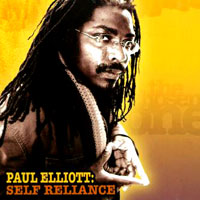 Paul Elliott: Self Reliance, Stronger Production Ltd., 2004 Paul Elliott: Self Reliance, Stronger Production Ltd., 2004
Rating: A
Leonard Howell, the first Rasta, would be pleased. Pride and self-sufficiency are the messages he preached to the small community of Rastafarians in Jamaica all those years ago. So yes, he would be delighted to know that through such productions as Paul Elliott’s Self Reliance, those precepts are still being taught, acknowledged as necessary and emphatically promoted. The key differences may be first, the use of reggae music to get the message across and second, the scope of the effort. The reach is certainly broader now, well beyond Jamaican Rastas, because the implications are now perceived as almost universal.
Unlike Howell’s eloquent but ponderous sermonizing, Elliott’s modus operandi in delivering his messages is to write and sing tuneful songs. His delivery alternates between rough and smooth as required, often in a call-and-response relationship with female background singers. On some of the most successful tracks, his vocal is also set against some lively toasting (“Self Reliance” with Daddy Rings, “Build Another Bridge” with Mango Seed, and “Chat Them a Chat Wi” with Richie Spice).
I don’t mean to suggest that the songs are all narrowly or boringly focused on the self-reliance theme. They promote a consistent value system, true, but in fact they offer different approaches, including a love song that proclaims, “…you bring out the best in me…I’ve got my pride and I’ve got true love”. Elliott’s sincerity and talent is such that the lyrics don’t really come across as preachy either, even when that’s in fact what’s going on, such as in “Bad Boy” (“You make a foolish decision…you never think about the consequence of life.”) Message songs they are, but they flow with ease. Instructive but entertaining, that’s what.
So whether or not you are a Jamaican Rasta, you can probably benefit from the wisdom of Paul Elliott’s lyrics. And no matter who you are, you can certainly benefit from the power and beauty of the music itself. You need some Self Reliance.
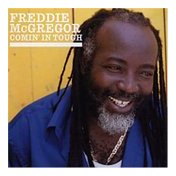 Freddie McGregor: Comin’ In Tough, VP Records, 2005 Freddie McGregor: Comin’ In Tough, VP Records, 2005
www.vprecords.com
Rating: B+
I like the balance that Freddie McGregor finds with his latest release, Comin’ In Tough. It’s like what brides seek for their weddings: something old, something new, something borrowed, something blue. The proper balance.
Something old. There’s a strong current of nostalgia running through this disk. The wish for Jamaica to recapture its past as a “beautiful island in the sun,” for example. Or consider such lyrics as, “Oh, it brings back memories.” The whole of track 8 is an effervescent three-minute return to 1950’s pop music – in its vocal style, in its cheesy organ accompaniment, in its “dee doop doop de doop” harmonies, and generally in its refreshing aura of innocence and simplicity. And then there’s McGregor’s rendition of the old Brotherhood of Man hit that goes, “United we stand, divided we fall.”
Something new. New to me, at least: I have never heard the line segment “twinkle twinkle little star…” used in such a serious, thoughtful song before; it’s included in the melodic but dread title track, linked to the singer’s expression of desire to learn “my destiny”. Also new are some highly contemporary arrangements (e.g. “Pick Yourself Up”) interspersed here and there among the more customary roots and dancehall productions. Oh, yes – most of the songs are new and impressively constructed, although often strongly derivative of earlier work by McGregor himself or others.
Something borrowed. A few of McGregor’s friends lend their immense vocal skills for this album, and the tracks they appear on are among the best. “Can You Feel It” is notable for its invigorating singer/deejay interaction with Anthony B, a real delight. Marcia Griffiths is another lender of talent, and finally Morgan Heritage, who offer soulful, enthusiastic interplay of voices and textures.
Something blue. Well, there is the line, “Girl, you make my grey skies blue.” Bluesy horns arise here and there, and the album concludes with a simple acoustic piece whose spoken parts owe a debt to the “talking blues” tradition. There is also the sensibility that roots reggae shares with “the blues,” a sensibility that arises from struggle and tribulation, and Comin’ In Tough definitely has its share of that.
Something old. Something new. Something borrowed. Something blue. The balance is what McGregor does best as he walks the figurative tight rope back to the future.
 Kingsley Wray: Chemistry, KA One, undated Kingsley Wray: Chemistry, KA One, undated
www.wateriiwine.org
Rating: B+
A few years ago I asked a young neighbour what music she listens to and the answer was “Country, except for the real twangy stuff; and Christian rock.” Last week I asked again, and got pretty much the same response. Nothing wrong with consistency, and I like it when people enjoy music of whatever sort. But I remember being quietly dismayed at her answer first time around, and I’m pleased to say I was less judgemental this latest time.
A few years ago I thought she was far too limited in her scope. “Country, except for the real twangy stuff” is practically a synonym for bland pop music, so give me the senior Hank Williams or George Jones or Patsy Cline anytime. As for “Christian rock,” I figured once you expunged the rebellion and sex and other interesting stuff from the music, you weren’t left with much but beat and melody and tedious lyrics seeking converts. So initially I felt sorry for my young neighbour.
I feel less sorry for her now. It seems that Christian rock at least, if not contemporary country, has expanded its horizons, incorporating sub-genres beyond boring old “hard rock” and “soft rock.” Now we’ve got hip-hop, dancehall and reggae in the blend. The overriding intent for some artists is still to convert, but they’ll get over that eventually. Fortunately, others are happy to entertain, stimulate thought, express themselves, and generally to treat their art as art rather than propaganda.
And that’s where Kingsley Wray’s Chemistry album comes into play. Good music is the overriding intent, Christian belief is the philosophical stance, and solid, tuneful reggae is the medium. Wray is an okay singer (although strangely he doesn’t do a great job on the opening tune); an inventive songwriter (but strangely derivative at times, with echoes of Sugar Minott here and Bunny Wailer there), and surrounds himself with talented instrumentalists, including Winston Wright and Sly Dunbar (nothing strange about them).
The result is a marvellous album – highly entertaining in its variety and musicianship, its Christian perspective profound but non-aggressive. I’m going to recommend this disk to my young neighbour next time I see her. One listen to the danceable “Labba Labba” or the catchy “Dry Bones” should convert her.
Rating: B+
I recognize myself in Inner Visions’ music. I think we share the “middle child” syndrome, reflecting the desire to be always the peacemaker, to reconcile differences, to bring opposing sides together.
What I hear on Frontline is a struggle to bring art and commerce together. This album wants to explore the forest of creativity and adventure without leaving the well trodden path of popularity and fan acceptance, where the groceries and rent money reside. (Not that being a reggae band these days is much guarantee of a huge fan base, but relatively speaking.) This album wants to meet expectations yet search out new possibilities at the same time.
So although tempered, there is a sense of freedom within this music. “It’s the first time we’ve been able to record live in studio instead of individual laying of tracks. What the fans hear in Frontline is really the energy that now exists in Inner Visions.” So said Phillip “Grasshopper” Pickering by e-mail; he’s the band’s guitarist and one of its two lead vocalists and song writers.
He has good reason to be pleased with the outcome. As well as exploration and energy, there’s lots of attention to detail. The instrumental tones and textures – ranging from rock guitar to strings to unidentifiable sound effects to female background chorus – were well chosen; they emphasize the structure of the songs and/or underscore the lyrics. Most of the melodies are strong enough that they may not have needed this highly arranged, full-production approach, but it suits them, both for the purposes of art and to meet the popular expectation of what modern roots reggae should sound like.
Returning briefly to the forest of creativity, here’s what always jumps out at me: Grasshopper’s stinging electric guitar from the first track onward; the solemnly intoned voice and backing hand drums that perfectly establish the gravity of the theme on “Front Line;” the great scatting by “Ras Paul” Samms on “Heartbreaker” and elsewhere; the amazing falsetto of someone called “Jupiter;” the slow, suspenseful groove of “Push;” the crunchy guitar riff for the tribute to Steel Pulse; and the light calypso feel in “Mama.”
Sure, there’s also the safer, more conservative side of Inner Visions, the side that will greatly appeal to many listeners. It’s blander than I prefer, but highly competent, and I cannot fault the band for trying to bring it into line with their edgy, artistic side. I would likely have done the same.
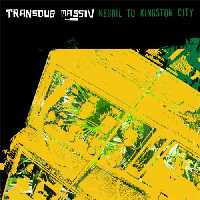 Transdub Massiv: Negril to Kingston City, Mystic Urchin Music, 2005 Transdub Massiv: Negril to Kingston City, Mystic Urchin Music, 2005
www.transdubmassiv.com
Rating: B
The throb of the bass is what’s responsible. It generates that hip-swaying, torso-twisting, head-nodding pulse of reggae that gets to us. It insinuates its way into our bodies and resides there as long as the music lasts. Or much longer, if the album is good enough.
Eventually, of course, the music needs more than that to keep us involved. Transdub Massiv’s Negril to Kingston City has the culprit bass and much more. Sometimes it also has less, when only strange, textured, indefinable sounds grab the ears. But usually it has more, such as voices and lyrics that are sometimes fleeting, sometimes substantial, now in the foreground, now deep in the mix. Musical instruments riff along emphatically and melodies are gradually revealed. It’s a complex dub production.
It is also strong music. “Under the Thatch” is the album’s second-last and most intriguing track, a mesmerizing, percussive, almost wordless visit to the heart of the jungle, accentuated by rain, propelled by thundering beat, and finally, at the end, humanized by an unexpected child’s voice.
Earlier highlights include the title track, with Jovi Rockwell and Farenheit chanting from inside an arrangement that manages to be both claustrophobic and atmospheric; “Dub is the Foundation,” with Sizzla and Christine Straw in an unruffled back and forth discussion of dub’s various attributes, all with melodica embellishment; and “40 Days,” featuring Rootz Underground and a lyric that’s less Biblical warning than modern commentary. But I especially like “Mi Nuh Waa Dat,” with Tami delivering a distinctive, highly feminine yet very assertive vocal alongside a bright keyboard riff. Ce’cile and Me’Shell Ndegeocello also contribute worthily to the disk.
Transdub Massiv has delivered a true musical force with this album, both when the bass is throbbing and on those rarer occasions when it’s not. I have used it as background soundtrack to my reading, and listened to it as foreground object of my careful attention. I move my body to it either way.
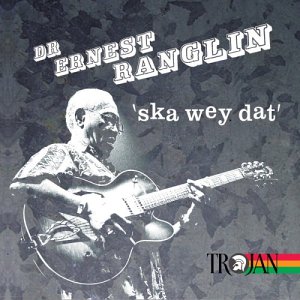 Ernest Ranglin: Surfin’, Tropic, 2005 Ernest Ranglin: Surfin’, Tropic, 2005
www.telarc.com
Rating: B
Ernest Ranglin may be the Willie Nelson of reggae. A wise old-timer, very relaxed and a bit grizzled, doing what he does with what sounds like the greatest of ease, impeccable in taste, not very exciting but refusing to feel guilty about that, and radiating art with every note he makes. Maybe Ranglin’s early musical accomplishments are a long way back (dating to 1948, actually), and maybe Red Headed Stranger is a long way back for Nelson too, but their artistry has never abandoned either one of them. Their talent is part of them forever, and that’s why every new release is a treat, every performance a quiet delight.
Surfin’ is the latest quiet delight from Ranglin, and it’s a jazzy guitar workout, as you would expect given the direction he has taken over recent years. Easy skanking reggae rhythms offer him the perfect foundations for building his intricate patterns, the vibrancy of his playing enriched by the input of a whole bevy of class-act reggae stalwarts. Among the contributing factors are Dean Frazer’s mellow saxophone, Robbie Lyn’s resourceful keyboards, Glen Browne’s restrained bass, and Bo Pee Bowen’s steady and cool rhythm guitar. The combined effort is a thing of subdued beauty.
The uniformly pleasant tunes are Ranglin originals, with the exception of a couple where the writing credits are shared, plus his take on Delroy Wilson’s ubiquitous “Dancing Mood,” in which Floyd Lloyd Seivright (hmm, I never knew he had a last name) does the only vocal on the album. To maintain the desirable level of variation in the flow, there’s some interesting percussion, including Nyahbinghi drumming.
Almost any instrumental album has a built-in possibility of becoming “mere” background music, and the jazz-oriented ones are in even greater danger. And so it may become with Ranglin’s Surfin’. But so what? It’s rewarding whether in back or up front. It’s a new old friend who doesn’t mind being taken for granted at times, but who will be right there, front and centre, whenever you are in need.
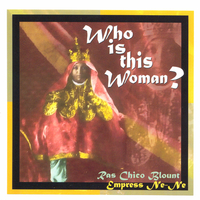 Ras Chico Blount/Empress Ne-Ne: Who is this Woman?, Music Doctors Productions, 2005 Ras Chico Blount/Empress Ne-Ne: Who is this Woman?, Music Doctors Productions, 2005
Rating: B-
Here we have Blount’s latest. Still idiosyncratic, still low-end production with spare instrumentation, with long chants still the mode, but these aren’t half bad. Close to enjoyable, even. What makes the difference? Check out the wondrous Empress – inspired co-artist, singer of half the tracks, necessary and welcome light touch.
I wouldn’t have guessed in listening to his last album that what Blount really needed was a woman. He needed something, that was clear, and now he has found it: the calm, dignified alto voice of Empress Ne-Ne. In contrast to Blount’s own quivering monotone, she carries a tune beautifully, even minimalist ones such as are on this disk. The mannered chanting style of Blount is thereby blunted by the more conventional vocal approach of his collaborator, resulting in a better balanced disk.
Not that they really operate as a close-knit duo. In the almost utter absence of liner notes, I have to assume that “S. Walford,” author of the odd-numbered tracks, is Empress Ne-Ne herself. That may not be so, and there definitely is an air of mystery about her persona. But in any case, those particular songs really belong to the Empress, who takes lead and presumably background vocals as well. The even-numbered tracks, credited to Blount, feature in turn his vocals, again for both lead and harmony background. So the division of labour is equitable and complete, if not shared in any real sense.
The lyrics relate to Rastafarian teachings, and a sampling of the song titles offers a good idea of the content: “Master of Love,” “My Soldiers,” “Glory to the King,” “Africa” and “Haile Selassie I.” The first track, “Who is this Woman?” has Empress Ne-Ne singing on the same choppy but appealing rhythm as the one Blount uses for the final track, “She’s His Empress.” Thus the circle closes, the cycle ready for another go-round.
That idea – another go-round – was never much of a temptation for me with Blount’s previous outings, but this is another story. Now I’m quite willing, thanks to Empress Ne-Ne. Who is this woman, anyway?
——————
Although the closest Ted Boothroyd has come to a personal association with the Caribbean was to have a Trinidadian grandfather, which Ted didn’t really have a lot to do with, he happily took in Harry Belafonte’s calypso hits in the ’50s and became a huge reggae fan in 1969 when Desmond Dekker’s “Israelites” hit big in Canada. Ted has reviewed books on Caribbean music for The Beat, writes album reviews for other periodicals, and co-hosts a reggae and world music radio show in Fredericton, New Brunswick, on Canada’s east coast. |